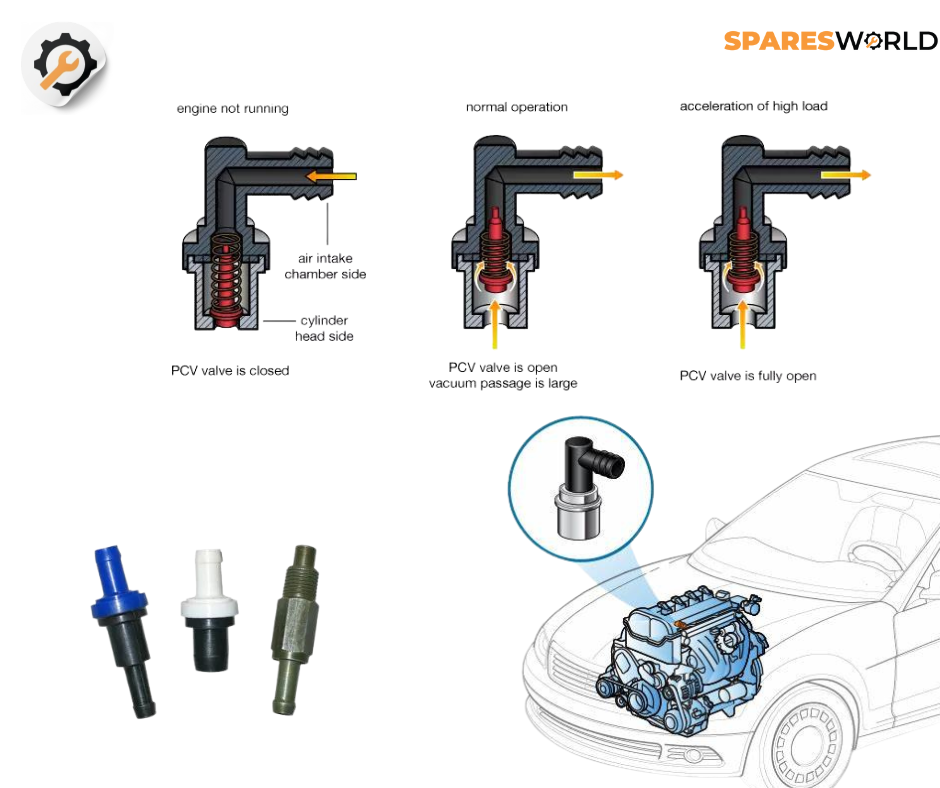Why You Shouldn’t Overlook the PCV Valve – The Small Valve that Protects Your Engine’s Lifeblood

When it comes to car maintenance, the PCV valve (Positive Crankcase Ventilation valve) often flies under the radar. But this tiny, inexpensive part plays a crucial role in keeping your engine healthy, your emissions low, and your car running smoothly. Overlooking it can lead to serious problems that can cost you far more than just the price of the valve itself. Let’s dive into why the PCV valve is such a vital part of your vehicle’s system—and why checking it should be a priority on your maintenance list.
What Does the PCV Valve Do?
The PCV valve is the gateway that helps regulate the flow of gases between your engine’s crankcase and the intake manifold. During combustion, some gases inevitably escape past the piston rings and into the crankcase. Without a PCV valve, these gases would build up pressure inside the engine, causing oil leaks, reducing engine efficiency, and creating harmful emissions.
The PCV valve reroutes these gases back into the intake manifold, where they are re-burned in the combustion process. This not only keeps your engine pressure in check but also reduces the pollutants your car emits. It’s a simple but powerful way to improve engine performance, fuel efficiency, and environmental responsibility all at once.
The Hidden Dangers of a Failing PCV Valve
For such a small part, the PCV valve carries a lot of weight. If it becomes clogged, stuck, or damaged, you could face a range of issues that impact your car’s performance and health. Here’s what can happen when the PCV valve is neglected:
-
Increased Engine Pressure and Oil Leaks When the PCV valve malfunctions, pressure builds up inside your engine’s crankcase. This excess pressure has to escape somewhere, and it often does so through oil seals and gaskets, leading to leaks. Over time, this can cause serious damage to your engine, resulting in costly repairs.
-
Reduced Fuel Efficiency A clogged PCV valve can throw off the delicate air-fuel mixture inside your engine. This leads to inefficient combustion, causing your car to burn more fuel than necessary and reducing your miles per gallon. If you notice a sudden drop in fuel efficiency, a bad PCV valve could be the culprit.
-
Sludge Buildup Without a working PCV valve, harmful combustion byproducts remain in the crankcase, mixing with the oil. This sludge can accumulate over time, clogging oil passages, damaging engine components, and even leading to engine failure if left unchecked.
-
Poor Engine Performance Symptoms like rough idling, poor acceleration, and misfires can all point to a failing PCV valve. Since the valve controls the flow of gases, when it’s not working properly, your engine struggles to maintain the right balance, affecting overall performance.
-
Higher Emissions The PCV valve plays a key role in reducing harmful emissions by recirculating crankcase gases. If the valve is clogged, these gases escape into the atmosphere, increasing your car’s carbon footprint and potentially failing emissions tests.
How to Check and Maintain Your PCV Valve
Luckily, maintaining your PCV valve is straightforward. Most valves are easy to access and inexpensive to replace. Here’s how you can check whether yours is functioning properly:
-
Locate the PCV Valve: The valve is usually connected to the engine’s valve cover, with a hose running to the intake manifold. Your car’s manual will show you exactly where to find it.
-
Listen for a Rattle: Gently shake the valve after removing it. A good PCV valve will rattle freely. If it doesn’t, it’s clogged and needs replacing.
-
Inspect for Oil Contamination: Look for any signs of oil leakage around the valve or the hoses connected to it. Excess oil in these areas can signal that the valve is no longer working correctly.
-
Replace It Regularly: While PCV valves can last a long time, it’s recommended to check and replace them during routine maintenance, typically every 20,000 to 50,000 miles, depending on your vehicle’s make and model.
A Small Investment, Big Payoff
The PCV valve might be a small, overlooked part, but its impact on your engine’s health and performance is undeniable. For just a few dollars and a little maintenance, you can avoid costly repairs, improve fuel efficiency, and keep your engine running smoothly for years to come.
At Sparesworld, we stock high-quality PCV valves for all types of vehicles. Not sure if yours needs replacement? Our team of experts can help you inspect and find the perfect part to keep your car in top shape. Don’t wait until engine problems arise—check your PCV valve today and keep your engine breathing easy!
Get the Best Parts with Sparesworld
Stay ahead of potential issues by checking your PCV valve regularly and sourcing top-quality replacements from Sparesworld. Need expert advice? We’re here to help with consultations and a wide range of parts to keep your car running at peak performance.
Don’t let a simple valve cause you big headaches—check your PCV valve today!

 Loading..
Loading..